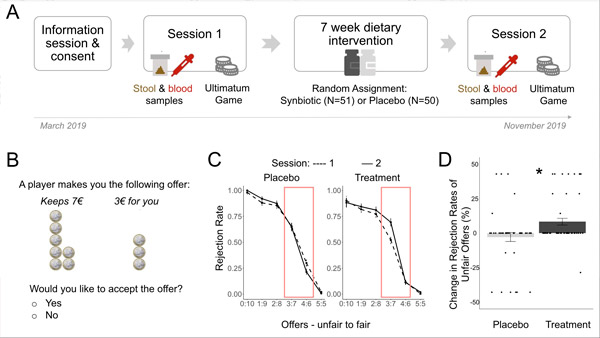Understanding the role of gut-brain microbiome interactions in social decision making
Sist anmeldt: 14.06.2024

Alt iLive-innhold blir gjennomgått med medisin eller faktisk kontrollert for å sikre så mye faktuell nøyaktighet som mulig.
Vi har strenge retningslinjer for innkjøp og kun kobling til anerkjente medieområder, akademiske forskningsinstitusjoner og, når det er mulig, medisinsk peer-evaluerte studier. Merk at tallene i parenteser ([1], [2], etc.) er klikkbare koblinger til disse studiene.
Hvis du føler at noe av innholdet vårt er unøyaktig, utdatert eller ellers tvilsomt, velg det og trykk Ctrl + Enter.

According to a study published in the journal PNAS Nexus, taking pro- and prebiotics may make people more sensitive to fairness, even at the cost of losing money.
The role of the human gut microbiome in shaping behavior is just beginning to be explored. Hilke Plassman and colleagues tested whether taking pro- and prebiotics could influence the level of altruistic punishment.
Fifty-one participants took a supplement containing Lactobacillus and Bifidobacterium for seven weeks. Another fifty participants served as a control group and took a placebo.
Before and after taking the supplement for seven weeks, participants were asked to play an “ultimatum game” in which one player controls the amount of money and can offer a share or “split” it with a second player. The second player can accept the offer and take the money, or reject it, in which case neither player will receive the money. Rejecting an unfair offer is interpreted as “altruistic punishment,” since the rejecter sacrifices whatever small share is offered to him to punish the first player for his lack of generosity.
Players who took nutritional supplements were more likely to reject offers. Specifically, they were more likely to reject offers with a 30%–40% split. (All players tended to reject highly unequal divisions.)

(A) Study flow and randomization. (B) An example of an unfair offer in the ultimatum game. (C) Distribution of refusal rates across all offers for each group and each session. (D) Variation in the rate of refusing unfair offers across sessions for each group (dots slightly shifted to improve visibility). Source: Plassmann et al.
Players who had a high ratio of Firmicutes to Bacteroidetes at the start of the study showed the greatest changes in both gut microbiota composition and levels of altruistic punishment. In some participants, supplementation reduced plasma levels of the dopamine precursor tyrosine, and it was these players who showed the most significant increases in altruistic punishment.
According to the authors, people who changed their gut microbiome to what is considered a healthier state became less rational and more sensitive to social aspects.
